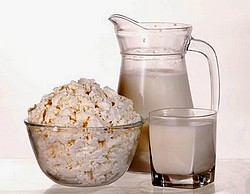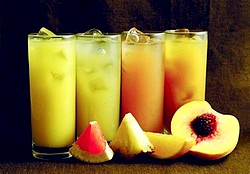Ayurveda teaches that each dosha has its own specific characteristics that make it unique. When you know them you can choose the right foods that reduce Vata, and avoid those that aggravate it. I have mentioned already in some other post that it is rather easy to balance a particular dosha through a diet. The most difficult thing here is to accept that diet and follow it; but once you start getting positive results the process will go much smoother. This Vata dosha food list should help you.
The idea of Vata reducing diet is to keep the dosha under control, to not let it dominate over the other two doshas in your body with the consideration of their original ratio (Prakriti).
Vata can increase in winter and early spring; the imbalance can manifest itself in the form of increased nervousness and irritability, lack of confidence, a sudden “explosive” over-excitability, which may easily get replaced by a breakdown. Frequent colds are common as well.
If you experience these symptoms, eat more substantial foods such as hot soups (not very hot, since it may not be good for the body), steamed vegetables and grains; but eat less of white rice and potatoes, raw food, particularly raw greens in salads, since these products may increase your dosha.
Oil and butter can help balance Vata; ghee especially good for this. Eat regularly, do not skip a meal. Reduce the intake of tea and coffee. Once the weather gets warmer (the summer comes), the Vata imbalance will fade away on its own.
Vegetables
Recommended: potatoes, fried zucchini, asparagus, squash, carrots, papaya, onion and garlic, cauliflower and broccoli, artichokes and squash.
Not recommended: radishes, spinach, red and white cabbage, eggplant, mushrooms.
Allowed in small quantities: skinless tomatoes, celery, leeks, beets, olives, savoy cabbage, bell peppers, lettuce, cucumbers.
Fruit
Recommended: ripe peaches, bananas, apricots, cherries, kiwi, dates, figs, pomegranates, tangerines, feijoa, blood orange, coconut, mango, most berries.
Vata should consume fruits daily. Fruit salads based kiwi, peaches and berries are very useful for Vata
Not recommended: grapes, pomelo fruit, rhubarb, and grapefruit.
Allowed in small quantities: watermelon, pears and apples, plums and cherry-plum, gooseberry, cranberry, cowberry, oranges, lemons, carambola, rabmutan, sweet pineapple.
Cereals, pulses and seeds
Recommended: tapioca, sesame seeds, oats, cracked wheat, rice, chick peas and mash.
Not recommended: barley, soy products, beans, pumpkin seeds.
Allowed in small quantities: buckwheat, whole wheat, lentils, corn grits, kidney beans, sunflower seeds.
Milk and dairy products
 Recommended: cow, buffalo and baked milk and ghee, cream, cottage cheese, buttermilk, sour cream, soft cheese, butter.
Recommended: cow, buffalo and baked milk and ghee, cream, cottage cheese, buttermilk, sour cream, soft cheese, butter.
Not recommended: low fat dairy products, cheese with noble mold.
Allowed in small quantities: goat milk, kefir, natural yogurt, hard cheese, ice cream.
Nuts
Recommended: sweet almonds, cashews, chestnuts, pine nuts.
Not recommended: bitter almonds, Brazil nuts, peanuts.
Allowed in small quantities: walnuts, hazelnuts, pecans, pistachios.
Spices and oils
Recommended: saffron, cumin, asafoetida, anise, fennel, vanilla, cinnamon, curry, cow parsnip, mint, thyme, green cardamom, sesame, pumpkin, almond and olive oil, cocoa butter.
Not recommended: mustard, paprika, vinegar, mustard oil, soy oil, corn and canola oil.
Allowed in small quantities: ginger, coriander, tarragon, lemon juice, sunflower oil and camelina oil, turmeric, nutmeg.
Drinks
 Recommended: warm and non-carbonated mineral water, diluted fresh juices, sweet fruit drinks.
Recommended: warm and non-carbonated mineral water, diluted fresh juices, sweet fruit drinks.
Not recommended: green tea, coffee, new wine and champagne, carbonated drinks, Kombucha, punch, dry white wine.
Allowed in small quantities: grog and mulled wine, cocoa, mate, black tea, jelly, mead.
Sweets
Recommended: sesame paste (halva), moist dried fruit, old honey and molasses, milk sweets.
Not recommended: kozinaki, dried sweets, young honey, and refined sugar.
Allowed in small quantities: vanilla and tahini paste, brown sugar.
Tips for Cooking Foods to Balance Vata Dosha
- Cook porridges with milk, serve with ghee.
- Cook pulses the right way otherwise they can cause fermentation and flatulence. The right way means you need to soak them (usually for the night) before cooking, and cook until tender.
- Most vegetables that are recommended for this dosha require heat treatment. The exception is made for avocado, tomato and cucumber.
- Voluminous salads with leafy greens are not advised for Vata dosha.
- Do not combine fresh fruits with the main meal. But you can drink compotes (stewed fruit) both before and during the meals. Fruit snacks without any other food consumed, are good for people with Vata Prakriti
- Have a glass of hot milk with cinnamon or ginger before the bedtime.
This food list for Vata dosha will help you choose the most appropriate foods to balance your dosha and avoid the problems associated with its aggravation.
